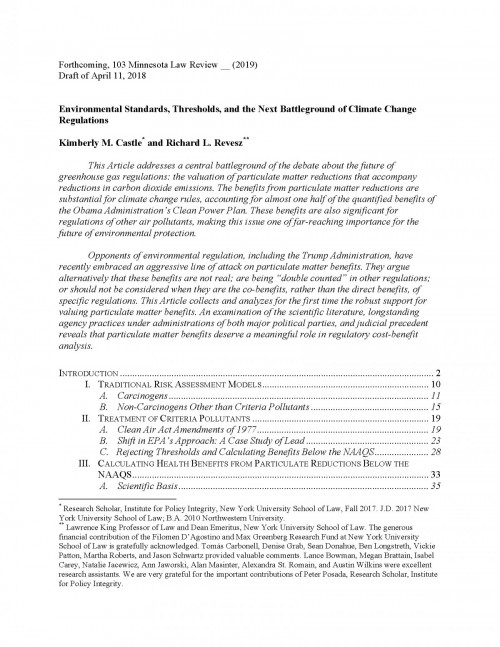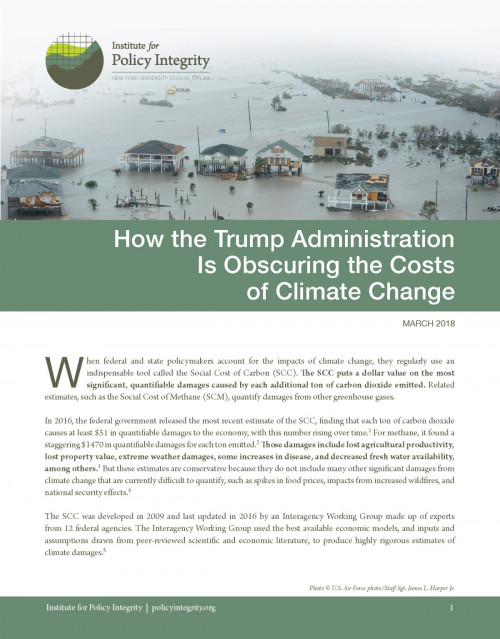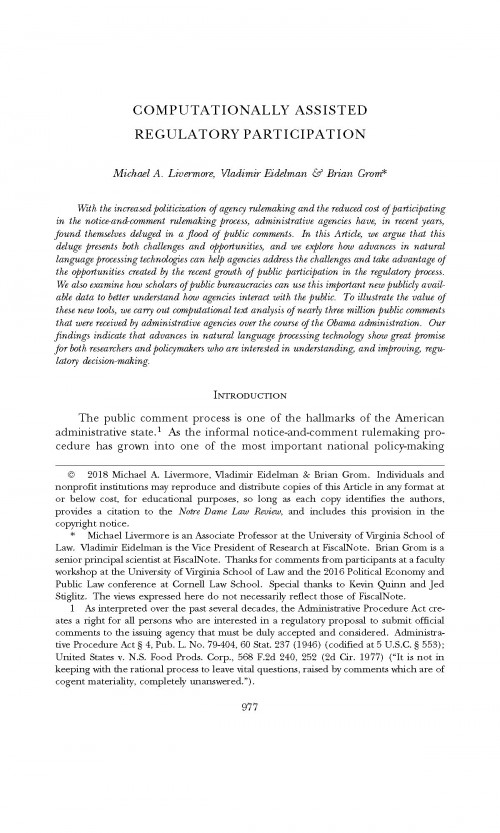-
Comments on Proposed Repeal of the Clean Power Plan
As the Environmental Protection Agency (EPA) continues its rulemaking to repeal the Clean Power Plan, we submitted two sets of comments that challenge EPA’s legal and economic arguments for undoing this important climate policy.
-

Environmental Standards, Thresholds, and the Next Battleground of Climate Change Regulations
Regulations to curtail climate change have the additional benefit of reducing air pollution by accelerating the shift away from carbon-intensive and high-polluting energy such as coal. The benefits from reducing just one air pollutant – particulate matter – account for almost half of the quantified benefits of the Obama Administration’s Clean Power Plan. Regulatory opponents have launched an aggressive attack on the use of these benefits to justify climate change regulations. They claim that these benefits are not real, are accounted for in other regulations, or should not be considered because they are indirect benefits. This article, published in the Minnesota Law Review, collects and analyzes for the first time the robust support for valuing particulate matter and other air pollution reduction benefits. Following an examination of the scientific literature, longstanding agency practices under administrations of both major political parties, and judicial precedent, the authors conclude that particulate matter benefits deserve a meaningful role in regulatory cost-benefit analysis.
-
Comments on Regulatory Impacts Draft Report to Congress
The Office of Management and Budget’s (OMB’s) annual reports to Congress not only compile all the significant benefits and costs of federal regulations, but they also offer federal agencies and academics an up-to-date summary of the literature on key practices in regulatory impact analysis. As such, OMB’s annual reports should reflect the most comprehensive syntheses of the legal and economic literature on these analytical practices. Our comments on OMB’s draft report for 2017 propose two additions to its summaries of the literature on job impact analysis and on co-benefits analysis
-
Brief to Forest Service on Expansion of Colorado’s West Elk Coal Mine
The U.S. Forest Service continues to ignore climate damages in its final approval of a coal mine expansion in Colorado, despite a court ruling that asked the Forest Service to disclose the effects of greenhouse gas emissions from the expansion. In its final environmental impact statement (EIS) on the project, Forest Service quantifies how much the expansion will increase greenhouse gases emissions but only gives a generic description of climate change and its effects. By not quantifying and monetizing the effects of this increase in emissions, the EIS obscures information necessary for the public to appreciate how the expansion will result in hundreds of millions of dollars in climate damages. Our brief to the District Court of Colorado argues that Forest Service’s failure to monetize climate impacts was arbitrary and is still in violation of the National Environmental Policy Act.
-
Comments on Provider Conscience Rule
The Department of Health and Human Services (HHS) recently proposed a rule purporting to clarify the scope of statutory protections for medical providers who decline to participate in certain procedures, such as abortion or euthanasia, due to religious or moral objections. HHS issued a similar rule in 2008 but rescinded it in 2011 due to concern that the 2008 rule’s expansive definitions of statutory terms would lead providers to believe, incorrectly, that statutory protections extended not just to refusals to perform particular procedures, but also to refusals to care for particular types of patients, such as LGBTQ individuals. Our comments criticize HHS for reviving the 2008 rule’s expansive definitions without acknowledging its 2011 findings that such definitions would foster confusion and discrimination.
-

How the Trump Administration Is Obscuring the Costs of Climate Change
When federal and state policymakers account for the impacts of climate change, they regularly use a tool called the Social Cost of Carbon (SCC). The SCC puts a dollar value on the most significant, quantifiable damages caused by each additional ton of carbon dioxide emitted. The most recent estimate of the cost is at least $51 per ton and rising over time. But now, turning its back on years of work, the Trump administration has disbanded the federal group that developed the SCC, and produced a new “interim” estimate claiming that each ton of carbon dioxide causes as little as $1 in climate damages. This issue brief describes how the Trump Administration reached this misleading number by ignoring the interconnected, global nature of our climate-vulnerable economy and obscuring the devastating effects that climate change will have on younger and future generations. Though the administration has been proposing rollbacks of environmental rules using this problematic SCC estimate as justification, we explain why federal agencies and state governments should continue using the most recent estimate by the Interagency Working Group that developed the SCC.
-
Brief on Deferred Action for Childhood Arrivals Program
In September 2017, the Department of Homeland Security (DHS) issued a memorandum rescinding the Deferred Action for Childhood Arrivals program (DACA), which had protected certain young people who were brought to the U.S. as children from deportation. A variety of plaintiffs—including the Regents of the University of California; several states, counties, and municipalities; and individual program participants—promptly challenged DHS’s decision in the U.S. District Court for the Northern District of California and secured a preliminary injunction blocking DHS from carrying out the rescission. DHS has now appealed that injunction to the U.S. Court of Appeals for the Ninth Circuit. Our brief, which urges the court to affirm the district court’s injunction, addresses only one issue in the case: DHS’s contention that it had a reasonable basis for rescinding DACA based on the “evident risk” that the program “would at a minimum be the subject of protracted litigation, and very likely be enjoined nationwide.”
-
Brief Challenging Suspension of NHTSA Rule on Fuel Economy Penalties
In 2017, the National Highway Traffic Safety Administration (NHTSA) suspended its 2016 Civil Penalties Rule, which adjusted the penalties for automobile manufacturer non-compliance with fuel economy standards for the first time in decades to reflect inflation. In issuing its suspension, NHTSA claimed that it was causing no harm. Our brief in the case challenging this suspension shows that NHTSA’s claim of no harm was inaccurate.
-

Computationally Assisted Regulatory Participation
With the increased politicization of agency rulemaking and the reduced cost of participating in the notice-and-comment rulemaking process, administrative agencies have, in recent years, found themselves deluged in a flood of public comments. In this article, published in the Notre Dame Law Review, the authors argue that this deluge presents both challenges and opportunities, and they explore how advances in natural language processing technologies can help agencies address the challenges and take advantage of the opportunities created by the recent growth of public participation in the regulatory process.
-
Comments on Interior’s Offshore Oil and Gas Leasing 2019-2024 Draft Proposed Program
The Department of the Interior’s offshore leasing program must analyze and account for the potential for environmental damage, the potential for the discovery of oil and gas, and the potential for adverse impact on the coastal zone. In addition, offshore oil and gas leases must provide fair market value for private use and development of these publicly-owned oil and gas resources. Our comments to the Interior’s Bureau of Ocean Energy Management (BOEM) explain why its Draft Proposed Program for 2019-2024, which would replace BOEM’s existing Program for 2017-2022, fails to meet its statutory mandates under the Outer Continental Shelf Lands Act (OCSLA).
Viewing recent projects in Government Transparency




